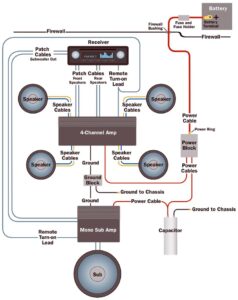Can a bad fuse drain your car battery? The answer is yes – a faulty fuse can indeed cause your car battery to drain. It may seem like a small and insignificant part of your vehicle’s electrical system, but a faulty fuse can wreak havoc on your battery’s life and performance. So, if you’re experiencing a mysterious battery drain that is causing you frustration and inconvenience, it’s time to delve deeper into this issue and understand the role of a bad fuse in draining your car battery. Let’s unravel the secrets behind this common problem and find a solution to keep your battery running smoothly.
Can a Bad Fuse Drain Car Battery?
Understanding the Importance of Fuses in a Car
Fuses play a crucial role in protecting the electrical systems of your car from damage caused by excessive current flow. They act as a safety mechanism by interrupting the circuit if there is a surge in electric current, preventing damage to sensitive components. Fuses are designed to blow or ‘pop’ when they detect an overload, thereby safeguarding the electrical system. However, a bad fuse can have unexpected consequences, including draining your car battery.
How Fuses Work
To comprehend how a bad fuse can potentially drain your car battery, it’s essential to understand how fuses operate. Fuses are essentially thin wires housed in a protective casing. When the current flowing through a circuit exceeds the fuse rating, the wire inside the fuse melts, opening the circuit and discontinuing the flow of electricity. This interruption prevents excessive current from damaging the electrical components.
The Impact of a Blown Fuse
When a fuse blows due to excessive current flow, it breaks the electrical circuit and stops the flow of electricity. As a result, the specific electrical component or system relying on that circuit will cease to function until the fuse is replaced. However, in certain cases, a blown fuse can have more significant repercussions, such as draining the car battery.
Can a Bad Fuse Drain a Car Battery?
While a bad fuse may not directly drain your car battery, its impact on certain electrical components can indirectly lead to battery drain. Here are some scenarios that explain how a bad fuse can cause power drainage:
1. Stuck Relay or Switch
If a fuse protecting a relay or switch fails, it can result in the component getting stuck in an ‘on’ position. This means that even when the vehicle is turned off, the stuck relay or switch can draw power from the battery continuously. Over time, this can drain the battery and lead to starting issues.
2. Continuous Power Drain from a Faulty Component
A blown fuse might also be a symptom of an underlying electrical issue in your car. In some cases, a faulty component or wiring that exceeds the fuse rating can cause the fuse to blow repeatedly. This continuous power drain can eventually deplete the car battery.
3. Parasitic Draw
Parasitic draw refers to continuous power consumption by certain electrical components, even when the vehicle is turned off. A bad fuse can potentially cause parasitic draw if it disrupts the functioning of a system that should shut down when the car is not in use, such as interior lights, the radio, or the power windows. If these systems continue to draw power due to a faulty fuse, it can slowly drain the battery.
Detecting and Troubleshooting a Bad Fuse
Determining whether a bad fuse is draining your car battery requires some troubleshooting. Here are the steps to follow:
1. Visual Inspection
Begin by visually inspecting the fuses in the fuse box. Look for any signs of a blown fuse, such as a broken or melted wire inside the fuse or a discolored appearance. If you identify a blown fuse, make sure to replace it with the appropriate rating to avoid further issues.
2. Testing the Fuses
Sometimes, a fuse might not display any visible signs of damage, but it may still be faulty. To test a fuse, you can use a multimeter set to the ohmmeter function. Touch the multimeter probes to both ends of the fuse. If the multimeter reads a resistance value of zero or infinity, it signifies a blown fuse that needs replacement.
3. Checking for Parasitic Draw
If you suspect a bad fuse is causing parasitic draw and draining your car battery, you can perform a parasitic draw test. This test involves disconnecting the negative battery cable and connecting an ammeter between the battery terminal and the disconnected cable. The ammeter will measure the current draw. If the reading exceeds the manufacturer’s specifications for your vehicle, it indicates a parasitic draw issue that requires further investigation.
Preventing Fuse-Related Battery Drain
To avoid potential battery drain caused by bad fuses, consider the following preventive measures:
1. Regular Maintenance
– Perform regular inspections of your car’s fuses to ensure they are in good condition.
– Check for any signs of damage, such as a blown wire or discoloration.
– Replace any blown fuses promptly with the appropriate rating.
2. Address Electrical Issues Promptly
– If you notice any electrical issues in your car, such as intermittent power loss or blown fuses, address them promptly.
– Ignoring electrical issues can lead to further damage and potentially drain your car battery.
3. Properly Maintain Battery
– Ensure that your car battery is in good condition and properly maintained.
– Regularly check the battery terminals for corrosion and clean them if necessary.
– Keep the battery connections tight to avoid any power disruptions.
4. Seek Professional Help
– If you are unsure about diagnosing or troubleshooting electrical issues in your car, it’s always best to seek professional assistance.
– Automotive technicians have the expertise and tools to accurately identify and resolve any fuse-related battery drain problems.
While a bad fuse itself may not directly drain your car battery, it can lead to situations where electrical components draw excessive power or remain powered even when the vehicle is turned off. Identifying and replacing bad fuses, addressing underlying electrical issues promptly, and performing regular maintenance can help prevent battery drain caused by faulty fuses. By understanding the importance of fuses and their potential impact on your car’s electrical system, you can ensure the proper functioning of your vehicle and minimize unexpected battery drain issues.
Frequently Asked Questions
Can a bad fuse drain a car battery?
Yes, a bad fuse can potentially drain a car battery. A fuse is designed to protect electrical circuits from excessive current flow, and when a fuse becomes faulty or blown, it can cause a continuous flow of power even when the vehicle is turned off. This constant power drain can eventually drain the car battery.
How can I tell if a fuse is bad and causing battery drain?
To determine if a bad fuse is causing battery drain, you can conduct a simple test. Start by disconnecting the negative terminal of the car battery. Then, using a multimeter set to the continuity mode, check the resistance across each fuse. If you come across a fuse that shows continuity or a very low resistance value, there’s a good chance that particular fuse is blown and causing a battery drain.
What other signs indicate a bad fuse causing battery drain?
In addition to a dead or drained battery, there are other signs that may indicate a bad fuse as the culprit. These can include malfunctioning electrical components, such as non-responsive power windows, a faulty radio, or inoperative lights. If multiple electrical components are not functioning properly, it’s worth checking the fuses for any faults.
Can I fix a bad fuse myself to prevent battery drain?
Yes, you can replace a bad fuse yourself to prevent battery drain. Locate the fuse box in your vehicle, which is usually found under the dashboard or in the engine compartment. Identify the faulty fuse by checking the fuse diagram provided in your car’s owner manual or on the fuse box cover itself. Once you’ve identified the correct fuse, simply pull it out using fuse pullers or pliers and replace it with a new one of the same amperage rating.
What should I do if the battery continues to drain even after replacing the fuse?
If replacing the bad fuse doesn’t solve the battery drain issue, it is recommended to seek professional assistance. There may be other electrical problems within the vehicle that are causing the drain, such as a faulty alternator, wiring issues, or a malfunctioning component that is not fuse-related. A qualified mechanic or automotive electrician will be able to diagnose and resolve the issue accurately.
Final Thoughts
A bad fuse has the potential to drain a car battery. When a fuse is faulty, it may cause an electrical circuit to remain active even when the car is turned off, leading to battery drainage over time. If you notice a sudden or recurring issue with your car battery, it is worth checking and replacing any bad fuses as part of your troubleshooting process. Neglecting this simple maintenance task can lead to unnecessary battery drainage and potential headaches in the future. Keep an eye out for any signs of a bad fuse, such as blown fuses or electrical malfunctions, to ensure your car battery remains in good condition.



